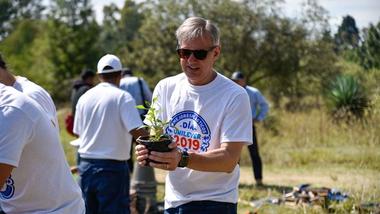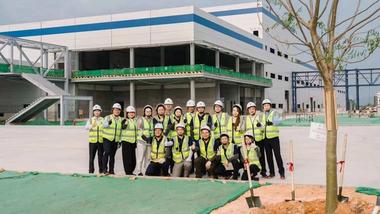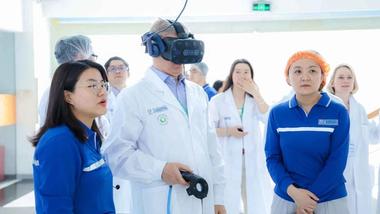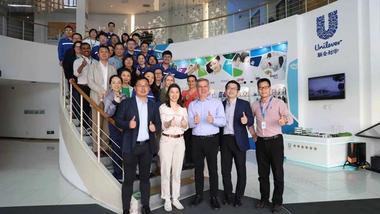Reginaldo Ecclissato’s history with Unilever spans 32 years, eight countries and a wide variety of roles. Since being named Chief Business Operations and Supply Chain Officer in 2022, Reginaldo has leveraged the combined power of technology, teamwork, data and partnerships to create an award-winning supply chain that is sustainable, effective and resilient from the first mile of production to the last.

Career and Leadership
Have you always worked in supply chain operations?
I’ve spent the majority of my career working within operations. After graduating as an electrical engineer, I started as a supply chain trainee with Unilever back in 1991. Since then, I’ve been fortunate to have worked in both developed and emerging markets in eight different countries. I’ve had a range of roles, from overseeing the construction of a new factory and the production of powder detergents in Brazil to leadership positions with responsibility for North, Latin and Central America.
What first attracted you to working at Unilever?
I was initially attracted to Unilever because of the company’s strong values which aligned with my own, as well as the opportunity to develop a global career, which was quite unusual 30 years ago.
What do you find most rewarding about the work you do?
I take immense pride in the fact that over my 32-year career, I’ve consistently prioritised mentoring individuals who can step into leadership roles and drive positive change. It has been a rewarding experience to witness the growth and success of those I’ve had the privilege to mentor.
How would you describe your leadership style?
I would say I’m an accessible leader who is both demanding and supportive. I believe in maintaining open lines of communication, creating an environment where my team feels comfortable approaching me with any questions, concerns or ideas they may have.
I also hold high expectations for my team and strive for excellence in our work. I firmly believe that setting challenging goals and pushing the boundaries of what we can achieve is essential for growth and success.
By combining such high expectations with a supportive approach, I aim to inspire and motivate my team to achieve their goals while fostering a collaborative and positive work environment.

Strategy, Innovation and Growth
Unilever has, for the 5th year in a row, been recognised by Gartner in its exclusive Masters category in Supply Chain Top 25 ranking. What do you think secured Unilever’s inclusion on the list this year?
It’s down to the ongoing dedication and hard work of our Business Operations teams, from Procurement and Customer Operations to everything in between.
I’m incredibly proud to be part of this world-class organisation, as we continue to embed a new internal structure while negotiating external challenges such as high inflation and the war in Ukraine. We’re offering our Business Groups both best-in-class and segmented services, fully leveraging the benefits of scale, cutting-edge technology, and strong central expertise.
I would say our long-term partnerships continue to be a key part of our success too. We’re leveraging technology for sustainability through major suppliers while also working with many small to medium-sized providers. And I cannot overplay the significance of the work we’re doing with suppliers of raw materials and ingredients to lower our climate impact.
Do you feel a new post-Covid normal has been established, despite the global challenges that have followed?
Covid-19 was a reminder to expect the unexpected and to prioritise investing in resilience and agility in our value chain. At the start of the pandemic, through our partner Scoutbee, we used artificial intelligence (AI) technology to find new collaborative manufacturers quickly in a safe and assured way.
Also during Covid, at our factories in Indaiatuba in Brazil and Guayas in Ecuador, we combined remote control and automation with advanced analytics and machine learning, allowing engineers and technicians to use the data generated by the towers’ algorithm to make strategic decisions around production from home.
Continuing to build resilience to avoid supply shortages is essential given the current economic and political context in which we’re operating, and we can expect more of the same as climate change impacts take hold. It’s the normal way of doing things now.
Business Operations is a driver of sustainable growth for the company. What will the priorities be for the function as we look to the years ahead?
We spent the last year rolling out our new organisational structure, so our focus now is firmly on delivering sustainable 4G growth for our Business Groups by driving superiority vs competition. That means growth that is consistent, competitive, profitable and responsible. It means a faster than ever roll-out of innovations and improvements and working closely with our Business Groups to move ahead with decarbonisation and sustainability.

Technology and Data
In terms of Business Operations, how have technology and digital helped increase efficiency?
We’re using technology to transform our value chain – from how we source our ingredients and raw materials to the way we make, sell and distribute our products to customers.
For example, we’re using an innovative data-storing technology called Graph to help us more easily identify the risk of a supply shortage in a particular geography, and quickly switch to different suppliers. Graph also allows us to map the sustainability impact of our products and develop sustainable portfolio strategies.
In factories such as Tianjin in China, we’re using renewable energy sources controlled by a smart management system, which has reduced our electricity consumption by around a third, thereby increasing our operational efficiency.
Port Sunlight in the UK is another good example. We’ve reduced our electricity use there by 10% by using Internet of Things (IoT) to monitor what’s happening on the factory floor in real time, sending that information to the Cloud, and alerting line leads to machines left on for two hours with no production.
And in logistics, our Virtual Ocean Control Tower is helping us to ensure we fill our containers more efficiently, sending automated alerts when capacity is below 60%, together with financial and CO2 impact. This system helped us save as much as €16 million in 2022.
What role does technology play in helping Unilever to deliver on its climate and nature commitments?
We’re seeing time and time again that investing in technology not only increases efficiency but also helps us deliver on climate and nature.
At our Dapada factory in India, machine learning and digital twin technology helped reduce energy consumption per tonne by 29% and emissions by 28% over the last four years. And downstream of our operations, the Virtual Ocean Control Tower I mentioned before helped us to reduce emissions from our shipments by about 15% in 2022 alone.
Upstream, together with Google and NGIS Australia (a leading provider of mapping technology), we’ve built geospatial capability enabling us to partner with data providers to have greater traceability and transparency in the first mile of our supply chain. Descartes Labs, for example, applies AI to satellite imagery to detect changes in forest cover and provides deforestation alerts that allow us to identify and act on that risk more rapidly.
How are we improving our data flow?
Something I’m particularly excited about is our work to gather carbon footprint data from suppliers for the products they sell to us, so we have a better understanding of our overall climate impact. We’ve standardised this data exchange, using an application programming interface (API) which allows suppliers to automatically share data in the same format, requiring only minimal processing resource on our end.
We’re also working with GreenToken by SAP, making use of blockchain to create and transfer virtual tokens for ingredients like palm oil that carry information about where ingredients were produced. Collecting this data helps us build a fuller picture of the relationships between mills, traders and farmers, and allows us to take actions to avoid deforestation.

Looking to the future
If we were to come back and speak to you in 2030, what particular highlights and tech innovations would you hope to be able to share with us?
Unilever has made a commitment to share the carbon footprint of every product we sell, and I want to be sure this information is both accurate and meaningful for consumers, so that it helps them compare products and make more sustainable choices when they shop. To get there, we need to keep increasing the exchange of real data across our supplier base, moving away from industry averages.
And by 2030, I want us to have maximised the positive impact we can have on both climate and nature, by finding ways for others in our value chain to also make use of helpful technologies. We want to use our influence for good, with the benefits going beyond the boundaries of our own business.
What challenges do you think we will face in the future and how will we overcome them?
Things are moving very quickly with technology and one challenge is making sure that we get our future-fit talent strategy right. So far, we have focused on upskilling our workforce and driving learning company-wide – including in our factories. We have seen that our employees want to learn about data and analytics, agile delivery and digital expertise.
When we get the tech right, we make magic happen. We see this day to day through our pioneering Lighthouse factories which are leading in technology and data-driven actions to become faster, more efficient, more effective and more automated.
Finally, if you could ask any other business leader at Unilever a question, what would it be?
I would ask Willem Uijen, Chief Procurement Officer, for his view on ‘Power of One and Focus of Five’ for procurement.
